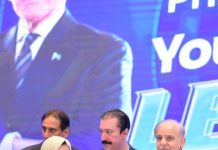LONDON: Abraaj Group founder Arif Naqvi has been released on bail after arranging a payment of £15 million – the largest security ever ordered in the UK’s judicial history.
A official at the Westminster Magistrates Court confirmed to media that the Pakistani businessman and philanthropist has been released from Wandsworth Prison after £15 million in cash was deposited with the court – which took over three weeks to raise since the decision granting him bail in early May.
A court official said: “Arif Naqvi is free. He has been released to his home after meeting all the conditions imposed by the Court, including the payment of security.
Naqvi’s bail application was also supported by three sureties, who offered an additional GBP 650,000 in surety in support of his bail.
The Abraaj founder, 58, was arrested at Heathrow Airport on Wednesday 10 April by officers from the Met’s Extradition Unit on behalf of the US authorities.

Naqvi was granted conditional bail at Westminster Magistrates’ Court, which was appealed, unsuccessfully, by the US Government. Justice Supperstone had ruled that the US Government, had not provided enough evidence to demonstrate that Naqvi, despite the allegations made against him by the US Government, was at risk of failing to surrender to the court or that he would violate any conditions of bail – hence, not deemed a flight risk.
It was accepted by the US government that Naqvi was a man of good character with ties to the UK. The judge also dismissed any suggestion that Naqvi could access a private jet, stating that there was no evidence to back up the claim or that he would be assisted to flee the UK by any Pakistani official, as had been implied.
Two of Naqvi’s associates – senior Abraaj executives Mustafa Abdel-Wadood in Manhattan and Sev Vettivetpillai in London – are already out on bail. Arif Naqvi had denied any wrongdoing maintaining his innocence.
Throughout since the Abraaj scandal broke out, Naqvi has been cooperating extensively with all parties focused on maximising creditor recoveries of the Abraaj Group, which was at its peak the largest private equity firm in emerging markets with assets under management of US$14 billion, known for its pioneering style of investing and helping grow companies, which resulted in billions of dollars in value that its investors made in profit.
A number of these investments were ground breaking in emerging markets and represent some of the biggest companies that have contributed to the emerging market boom.
Naqvi’s lawyers have stated that the US government was not being truthful in alleging that Naqvi took money out for his personal benefit at the expense of the group was incorrect where through each hearing their numbers changed given the rebuttals by Naqvi’s lawyers. The legal team has maintained before the court that any monies which Naqvi had taken out were legally entitled to him through his contractual arrangements with the company, and specifically also pointed out that no monies were moved from funds to Naqvi’s direct personal benefit directly from the funds – and the US allegations were in fact wrong, incorrect and misleading.



